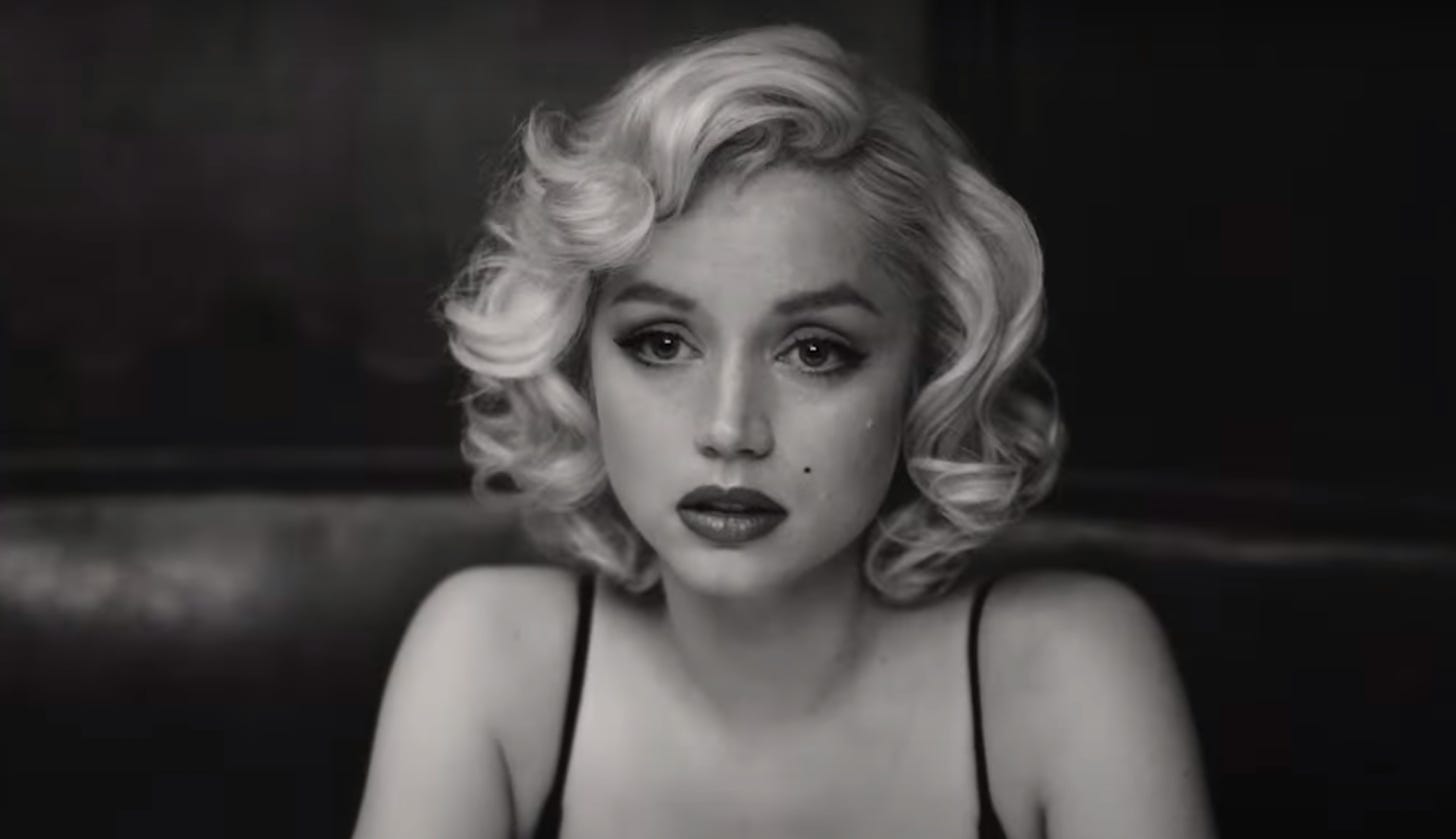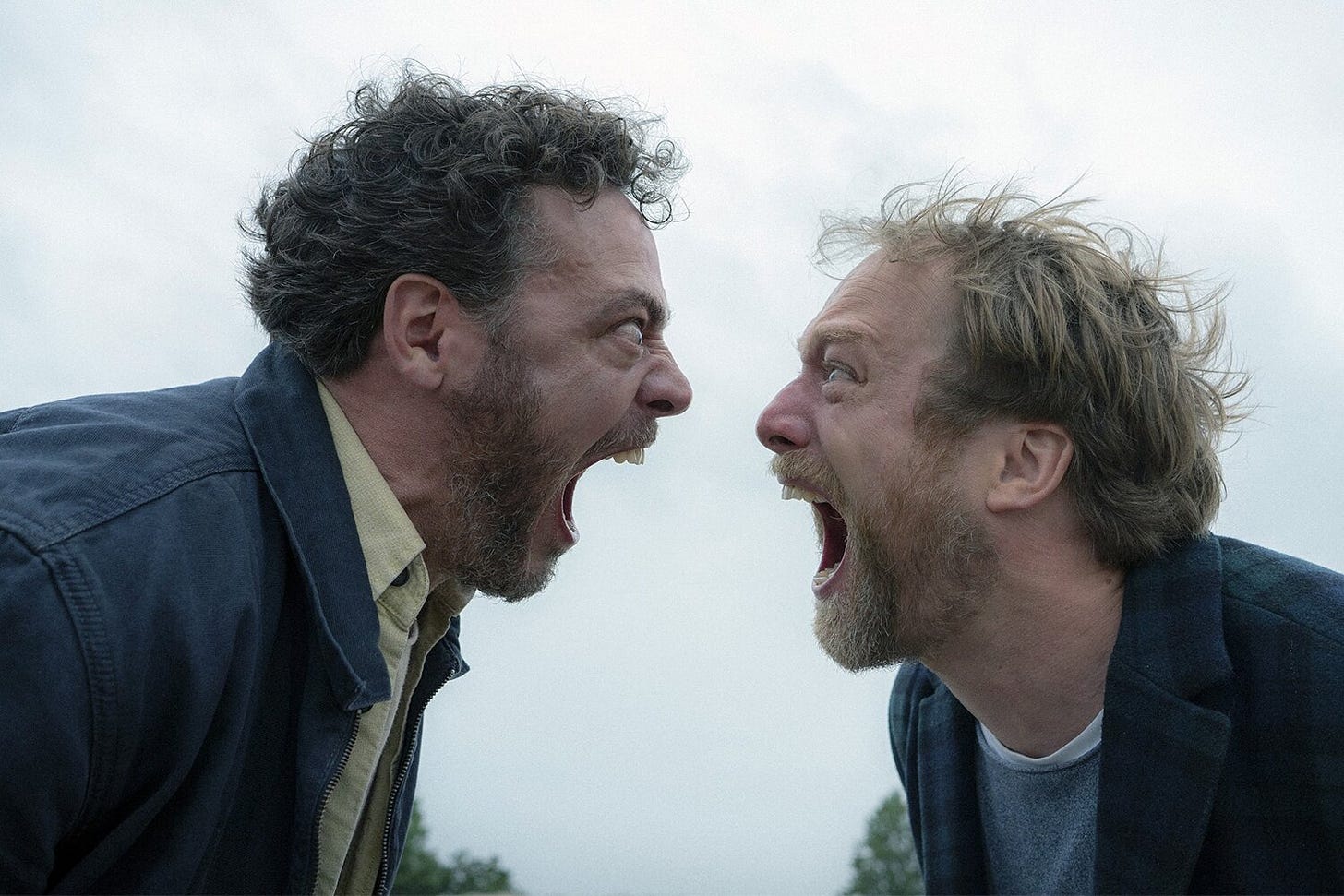In Review: 'Blonde,' 'Speak No Evil'
A new biopic of Marilyn Monroe turns her life into an elongated nightmare and a new Danish film traffics in a more domestic sort of horror.
Blonde
Dir. Andrew Dominik
166 min.
Blonde is a film made with considerable flourish and directorial muscle — often with too much flourish and muscle — but one of its most affecting moments involves nothing more than a mirror, a gently moving camera, and the human face. In a continuous shot we watch a fragile woman (Ana de Armas) broken down by disappointment, pills, and mental illness transform herself into the glamorous star with the alluring half-smile familiar from movies (and t-shirts, posters, Warhol prints and on and on). It’s not a subtle moment. Nothing in the film is subtle. But it’s also a breathtaking act of physical performance, one of many such moments from de Armas in Andrew Dominik’s bludgeoning, relentless, harrowing adaptation of Joyce Carol Oates’ 2000 novel inspired by the life of Marilyn Monroe.
In discussing the novel, Oates has said she came to see Monroe as her equivalent of Moby Dick’s white whale, an oversized symbol capable of carrying the weight of history, politics, fashion, culture, and anything else Monroe brushed up against during her short life. The film takes her from Hollywood to Broadway to the corridors of power, but Dominik doesn’t quite see her as Oates does, treating her instead as a woman doomed from birth, one whose rise was itself a kind of fall, one in which she lost control of her life and identity as others used her. It’s a point made from the film’s earliest scenes, in which the future Marilyn Monroe’s mother Gladys (Julianne Nicholson) attempts to kill her in a fit of madness while blaming her for all the disappointments she’s experienced in life through its final moments. (You probably know how this story ends.) Along the way, Blonde keeps circling back to Monroe’s life as being defined by a need for the father she never knew. She calls the men in her life daddy. She has an affair with the president, a kind of final-level daddy. It’s daddies all the way down.
It’s simplistic and reductive. It’s also haunting in ways that are tough to dismiss. Much of the credit belongs to de Armas’s performance, which remains locked into Monroe’s humanity even in her most dehumanizing moments. Dominik’s decision to depict those in graphic detail over the course of the film’s nearly three-hour running time will likely make Blonde unbearable for many viewers, but it also defines the film. Dominik stages every moment for maximum impact and with minimal subtlety, offering repeated shots of fetuses in utero, what can only be described as vaginal POV shots during scenes of involuntary abortions (there are two), a toilet’s-eye view of a drugged-out Monroe throwing up, and a fellatio sequence that helped earn an NC-17 rating. Early on the movie stakes out turf in the territory we usually call Too Far and then stays there.
Yet it plays like an act of purposeful outrage, as if Dominik, taking cues from Oates, decided the only way to depict the tragical history of Marilyn Monroe was to portray that tragedy in its excruciating particulars. It’s awful, but you could only call it exploitative if it didn’t ring true to the star-making industry as it was then and still remains. Blonde’s filled with echoes of everyone from Harvey Weinstein to Anne Heche to Bill Clinton, and scene after scene presents Monroe as someone never seen as a full person by anyone she encounters, especially men. (Of the men in her life, “The Playwright,” a not-really-disguised Arthur Miller played by Adrien Brody comes out best, but even he seems to be in love with a Monroe of his own creation.)
What begins as a fractured attempt at biography ends as a horror film, but maybe that’s what it was all along. It might be possible to tell Monroe’s story in a way that makes her more than a vessel for sadness and an object of abuse, but that’s not the film Dominik set out to make. Blonde is both too much and not enough. It’s a fever dream nightmare that visits the worst the world has to offer on a woman who never really had a chance, but the story it tells never rings false. — Keith Phipps
Blonde begins playing in select theaters on Friday and will debut on Netflix on September 28.
Speak No Evil
Dir. Christian Tafdrup
97 min.
“Just take a small bite, honey.”
That’s Bjorn (Morten Burian), encouraging his wife Louise (Sidsel Siem Koch), a vegetarian, to try a nibble of wild boar that’s been cooking on the stove all day. Bjorn and Louise, along with their daughter Agnes (Liva Forsberg), have driven from Denmark to a secluded country home in Holland on a weekend getaway with another family they met on vacation. They don’t know their hosts, Patrick (Fedja van Huêt) and Karin (Karina Smulders) that well—in fact, accepting the invitation at all was a bone of contention—so to refuse their hospitality might seem awkward, even though Louise had mentioned her vegetarianism to them before. Bjorn and Louise don’t want to ruffle feathers, so she obliges.
There are ominous moments aplenty in the early moments of Speak No Evil—the score, by Sune Kølster, has the feel of Wendy Carlos and Rachel Elkind’s work on The Shining—but the boar nibble will feel familiar to anyone who’s polite to a fault. How often do we deny our conscience in order to avoid conflict? And what does that signal to people who are schooled at exploiting that weakness? Though Christian Tafdrup’s unnerving horror film eventually tips into a full-blown Euro-shocker, its strongest scenes center on relatively anodyne hassles that, in sum, take the shape of deliberate psychological warfare. Tafdrup hooks you in with social miscues, microaggressions, and common rudeness before imagining the worst place all of it could lead. It’s a Type B nightmare come slowly yet ferociously to life.
Under the Tuscan sun, the two families hit it off and end their brief, pleasant time together with the seemingly empty promise of the Danish city slickers coming out to the country some day. It’s only an eight-hour drive, after all. When an invitation actually arrives, Bjorn ropes a skeptical Louise into going, because their hum-drum routine could use some shaking up. The one odd hiccup is that Patrick and Karin’s son Abel (Marius Damslev) has no tongue, which renders him literally and symbolically mute, but he and Agnes are like-aged and seem to get along well enough. There’s no single incident that has the visitors fleeing the house—and, more to the point, nothing so bad that they feel the need to say something.
Speak No Evil isn’t ambiguous in its messaging, which it suggests everywhere, including the title, before just laying it right out in the dialogue. As a portrait of ineffectual, bourgeois fatherhood, it recalls Force Majeure, Ruben Östlund’s biting satire about a man who fails his family during a perilous moment on a skiing trip. Yet Bjorn feels penned-in by what’s expected of him, which has the odd effect of making Patrick’s carefree boorishness a little appealing, like the note of wildness that he’d been denying himself. His crisis of masculinity isn’t to blame for what happens to him and his family, but it’s a quiet contributor to the vile actions that are taken against them. Though Tafdrup takes the film to unfathomably (and gratuitously) grim places in the final third, Speak No Evil feels like a twisted modern fairy tale, one where the characters are lured into the deep, dark forest. There’s a moral to the story here, too. — Scott Tobias
Speak No Evil is currently in limited release. It starts streaming on Shudder tomorrow.









Do you think the director of Speak No Evil has seen Twin Peaks
It's been years since I last watched The Assassination of Jesse James but I remember it as a reasonably subtle movie. Definitely not the case for Killing Them Softly, or (sounds like) for Blonde. It's a shame. I'm getting so tired of movies screeching messages at me (recent example, Don't Look Up), and having a male director screech at me about sexism is not appealing, to say the least. My kingdom for more films that made their cases as devastatingly as Ex Machina!